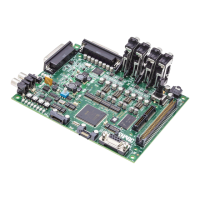ADSP-214xx SHARC Processor Hardware Reference A-241
Registers Reference
3 (RO) TXS Transmit Data Buffer Status. TXSPI data buffer status.
0 = Empty
1 = Full
4 (W1C) ROVF Reception Error. ROVF is set when data is received with
receive buffer full.
5 (RO) RXS Receive Data Buffer Status. The ROVF flag (bit 4) is when a
new transfer has completed before the previous data is read
from the RXSPI register. This bit indicates that a new word
was received while the receive buffer was full. The ROVF flag
is cleared by a W1C-type software operation. The state of the
GM bit in the SPICTL register determines whether the
RXSPI register is updated with the newly received data or
whether that new data is discarded.
0 = Empty
1 = Full
6 (W1C) TXCOL Transmit Collision Error. When TXCOL is set, it is possible
that corrupt data was transmitted.
The TXCOL flag (bit 6) is set when a write to the TXSPI reg-
ister coincides with the load of the shift register. The write to
TXSPI can be via the software or the DMA. This bit indicates
that corrupt data may have been loaded into the shift register
and transmitted. In this case, the data in TXSPI may not
match what was transmitted. This error can easily be avoided
by proper software control. The TXCOL bit is cleared by a
W1C-type software operation.
Note that this bit is never set when the SPI is configured as a
slave with CPHASE = 0. The collision may occur, but it can-
not be detected.
7 (RO) SPIFE External Transaction Complete. Set (= 1) when the SPI
transaction is complete on the external interface. This bit is
very useful in DMA mode showing that the peripheral has
completed all the external transfers corresponding to the
DMA programmed. For more information, see “Transfer Ini-
tiate Mode” on page 15-13 and “DMA Transfers” on
page 15-21.
31–8 Reserved
Table A-125. SPISTAT Register Bit Descriptions (RO) (Cont’d)
Bit Name Description

